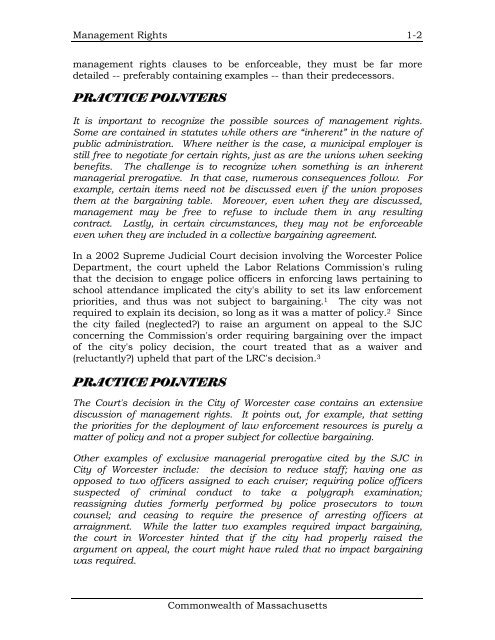Management Rights - AELE's Home Page
Management Rights - AELE's Home Page
Management Rights - AELE's Home Page
You also want an ePaper? Increase the reach of your titles
YUMPU automatically turns print PDFs into web optimized ePapers that Google loves.
<strong>Management</strong> <strong>Rights</strong> 1-2<br />
management rights clauses to be enforceable, they must be far more<br />
detailed -- preferably containing examples -- than their predecessors.<br />
PRACTICE POINTERS<br />
It is important to recognize the possible sources of management rights.<br />
Some are contained in statutes while others are “inherent” in the nature of<br />
public administration. Where neither is the case, a municipal employer is<br />
still free to negotiate for certain rights, just as are the unions when seeking<br />
benefits. The challenge is to recognize when something is an inherent<br />
managerial prerogative. In that case, numerous consequences follow. For<br />
example, certain items need not be discussed even if the union proposes<br />
them at the bargaining table. Moreover, even when they are discussed,<br />
management may be free to refuse to include them in any resulting<br />
contract. Lastly, in certain circumstances, they may not be enforceable<br />
even when they are included in a collective bargaining agreement.<br />
In a 2002 Supreme Judicial Court decision involving the Worcester Police<br />
Department, the court upheld the Labor Relations Commission's ruling<br />
that the decision to engage police officers in enforcing laws pertaining to<br />
school attendance implicated the city's ability to set its law enforcement<br />
priorities, and thus was not subject to bargaining. 1 The city was not<br />
required to explain its decision, so long as it was a matter of policy. 2 Since<br />
the city failed (neglected?) to raise an argument on appeal to the SJC<br />
concerning the Commission's order requiring bargaining over the impact<br />
of the city's policy decision, the court treated that as a waiver and<br />
(reluctantly?) upheld that part of the LRC's decision. 3<br />
PRACTICE POINTERS<br />
The Court's decision in the City of Worcester case contains an extensive<br />
discussion of management rights. It points out, for example, that setting<br />
the priorities for the deployment of law enforcement resources is purely a<br />
matter of policy and not a proper subject for collective bargaining.<br />
Other examples of exclusive managerial prerogative cited by the SJC in<br />
City of Worcester include: the decision to reduce staff; having one as<br />
opposed to two officers assigned to each cruiser; requiring police officers<br />
suspected of criminal conduct to take a polygraph examination;<br />
reassigning duties formerly performed by police prosecutors to town<br />
counsel; and ceasing to require the presence of arresting officers at<br />
arraignment. While the latter two examples required impact bargaining,<br />
the court in Worcester hinted that if the city had properly raised the<br />
argument on appeal, the court might have ruled that no impact bargaining<br />
was required.<br />
Commonwealth of Massachusetts
















